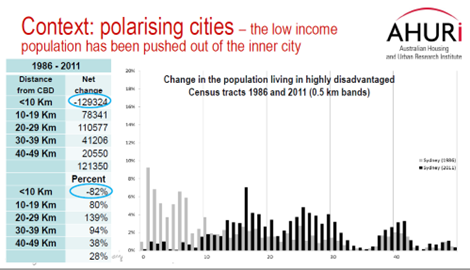
How can housing policies improve Australia's urban productivity?
Over recent decades Australia’s housing system has shown reductions in rates of affordable housing, stable tenure housing and affordable locations close to employment, all of which weaken urban productivity growth. This Brief presents policy options that can improve the qualities of Australia’s housing market, so as to improve urban productivity growth.
This Brief incorporates material previously published in AHURI’s Policy Issues Analysis series in 2015.
02 Oct 2022
The housing market influences Australia's economy in that housing of good physical quality, with tenure conditions that provide stability, is affordable, is close to jobs and is in socially mixed neighbourhoods can accelerate urban productivity growth. Equally a housing system where these characteristics are reduced can act to lessen human and social capital and thereby weaken urban productivity growth.
Productivity is ‘the efficiency with which an economy transforms inputs (e.g. labour and capital) into outputs (such as goods and services)'. Productivity growth is when the economy produces more goods and services from the same quantity of labour, capital, land, energy or other resources. The assumption is that improved productivity can generate higher real incomes and lead to long-term improvements in Australia's living standards.
Over recent decades Australia’s housing system has exhibited traits that have likely weakened urban productivity growth. The more stable tenure forms (home ownership and public rental) now house fewer households. The location of affordable housing for lower income workers has drifted further from CBDs. Indeed, AHURI research reveals that between 1986 and 2011, the percentage of people on lower-income living within 10 kilometres of Sydney's job-rich CBD dropped by 82 per cent.

The suburbanisation and concentration of disadvantage has reduced social mix. Each of these trends undermines the formation of human and social capital, in turn acting as a drag on urban productivity growth.
Policy development options
While the impact of housing investment on national income and employment in the short-term is well-measured and understood, there is less understanding on how housing impacts on long-term growth and productivity.
Housing policies that aid urban productivity growth will need to provide for factors such as greater housing stability, improved social mix and enable easier access to jobs.
Options for policies that provide for greater stability of household tenure include supporting entry to home ownership, such as through targeted first home owner grants, stamp duty exemptions or shared equity schemes; growing the supply of secure tenure social housing such as through developing a large scale affordable housing industry or through increased investment by government in the supply of public housing; and reforming the private rental market to enable and encourage longer term leases.
Options for policies that promote neighbourhood social mix include a geographically diverse supply of affordable housing stock; land use planning measures that allow for a diversity of house types and sizes; require a percentage of affordable housing in new developments; and preserve existing affordable housing stock.
Options for policies that connect housing with labour markets and enable ready access to jobs include infrastructure development that is focused on jobs; transport and connectivity (including digital connectivity); and housing.
This Brief incorporates material previously published in AHURI’s Policy Issues Analysis series.




